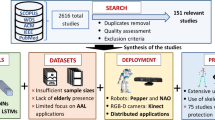Abstract
As the global population continues to age, there is a concurrent rise in the number of individuals experiencing cognitive impairment and dementia, underscoring the critical necessity to address their hospice needs and quality of life concerns. Numerous studies have underscored the positive impact of exposure to outdoor environments on their overall condition and well-being. However, cognitive challenges often hinder their capacity to perform basic tasks independently, necessitating frequent assistance from onsite professionals. Complicating matters further, the complexity of outdoor settings often results in difficulties in identifying and recognizing personnel. This paper introduces Profinder, a system designed to assist individuals with cognitive impairment in identifying occupational personnel at specific outdoor locations and accessing essential assistance. Utilizing advanced deep learning techniques, Profinder seamlessly integrates foreground and background information, incorporates attention mechanisms, and harnesses siamese networks for efficient information decoupling, thereby achieving occupational recognition on smart mobile devices with an accuracy rate exceeding 90%. Additionally, a meticulously curated dataset dedicated to occupation recognition was devel0oped to facilitate and validate this research endeavor. By providing a robust auxiliary tool for individuals with cognitive impairment, this research endeavors to enhance their autonomy and overall quality of life, while also laying a solid foundation for further exploration and innovation in this burgeoning field, both within academia and industry.
Supported by the Humanities and Social Sciences Youth Foundation, Ministry of Education of China (Grant No.20YJCZH172), the China Postdoctoral Science Foundation (Grant No. 2019M651262).
Access this chapter
Tax calculation will be finalised at checkout
Purchases are for personal use only
Similar content being viewed by others
References
Lee-Cheong, S., Amanullah, S., Jardine, M.: New assistive technologies in dementia and mild cognitive impairment care: a PubMed review. Asian J. Psychiatr. (2022)
Hirschman, I.I., Widder, D.V.: The Convolution Transform. Courier Corporation (2012)
Vaswani, A., et al.: Attention is all you need. In: Advances in Neural Information Processing Systems, vol. 30 (2017)
Neal, D.P., Kerkhof, Y.J.F., Ettema, T.P., et al.: Evaluation of FindMyApps: protocol for a randomized controlled trial of the effectiveness and cost-effectiveness of a tablet-based intervention to improve self-management and social participation of community-dwelling people with mild dementia, compared to usual tablet use. BMC Geriatr. 21(1), 1–15 (2021)
Cammisuli, D.M., Pietrabissa, G., Castelnuovo, G.: Improving wellbeing of community-dwelling people with mild cognitive impairment: the SENIOR (SystEm of nudge theory based ICT applications for OldeR citizens) project. Neural Regen. Res. 16(5), 963 (2021)
McGoldrick, C., Crawford, S., Evans, J.J.: MindMate: a single case experimental design study of a reminder system for people with dementia. Neuropsychol. Rehabil. 31(1), 18–38 (2021)
Rose, K.M., Coop Gordon, K., Schlegel, E.C., et al.: Smarthealth technology study protocol to improve relationships between older adults with dementia and family caregivers. J. Adv. Nurs. 77(5), 2519–2529 (2021)
He, K., et al.: Deep residual learning for image recognition. In: Proceedings of the IEEE Conference on Computer Vision and Pattern Recognition (2016)
Huang, G., et al.: Densely connected convolutional networks. In: Proceedings of the IEEE Conference on Computer Vision and Pattern Recognition (2017)
Dosovitskiy, A., et al.: An image is worth 16x16 words: transformers for image recognition at scale. arXiv preprint arXiv:2010.11929 (2020)
Liu, Z., Lin, Y., Cao, Y., et al.: Swin transformer: hierarchical vision transformer using shifted windows. In: Proceedings of the IEEE/CVF International Conference on Computer Vision, pp. 10012–10022 (2021)
Yao, D., Shao, Y.: A data efficient transformer based on Swin Transformer. Vis. Comput., 1–10 (2023)
Liu, Z., et al.: A ConvNet for the 2020s. In: Proceedings of the IEEE/CVF Conference on Computer Vision and Pattern Recognition (2022)
Woo, S., et al.: ConvNeXt V2: co-designing and scaling convnets with masked autoencoders. In: Proceedings of the IEEE/CVF Conference on Computer Vision and Pattern Recognition (2023)
Chopra, S., Hadsell, R., LeCun, Y.: Learning a similarity metric discriminatively, with application to face verification. In: 2005 IEEE Computer Society Conference on Computer Vision and Pattern Recognition (CVPR 2005) (2005)
Chen, X., He, K.: Exploring simple siamese representation learning. In: Proceedings of the IEEE/CVF Conference on Computer Vision and Pattern Recognition (2021)
Author information
Authors and Affiliations
Corresponding author
Editor information
Editors and Affiliations
Rights and permissions
Copyright information
© 2025 The Author(s), under exclusive license to Springer Nature Switzerland AG
About this paper
Cite this paper
Wang, Y., Xiong, Y., Yang, T., Shen, Y. (2025). Profinder: Towards Professionals Recognition on Mobile Devices for Users with Cognitive Decline. In: Cai, Z., Takabi, D., Guo, S., Zou, Y. (eds) Wireless Artificial Intelligent Computing Systems and Applications. WASA 2024. Lecture Notes in Computer Science, vol 14999. Springer, Cham. https://doi.org/10.1007/978-3-031-71470-2_3
Download citation
DOI: https://doi.org/10.1007/978-3-031-71470-2_3
Published:
Publisher Name: Springer, Cham
Print ISBN: 978-3-031-71469-6
Online ISBN: 978-3-031-71470-2
eBook Packages: Computer ScienceComputer Science (R0)




